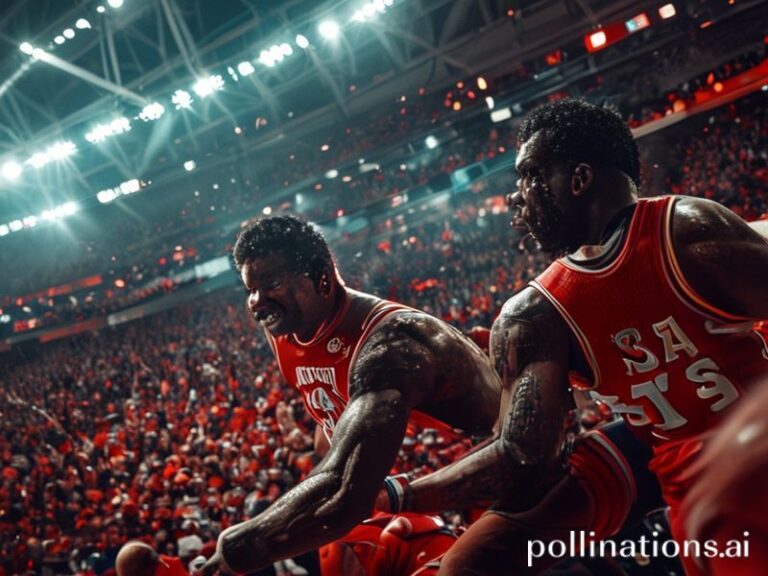Kate Hudson’s Global Empire: Soft-Power Leggings, Vodka Diplomacy, and the End of Borders
Kate Hudson, the American actress forever frozen in the collective unconscious as the manic-pixie record-store girl from “Almost Famous,” has spent the last two decades proving that a single cinematic sunbeam can illuminate a surprisingly large swath of the planet. From the neon canyons of Tokyo’s Shibuya—where her Fabletics athleisure line is hawked on jumbotrons between bullet-train ads—to the fluorescent aisles of São Paulo pharmacies where her King St. vodka competes with sugar-cane cachaça for self-medication supremacy, Hudson has quietly become a soft-power export more durable than many nation-states’ cultural attachés. Call it imperialism in spandex.
Let’s be clear: no one in Kyiv is huddled in a metro station right now whispering, “If only Kate Hudson drops a new wellness elixir.” Yet the global machinery that catapults her various ventures across borders is the same one that ensures a Ukrainian teenager can doom-scroll Instagram between air-raid sirens and still be served an algorithmic nudge toward Hudson’s latest probiotic gummy. The juxtaposition is grotesque, yes, but so is everything else in late-stage capitalism; at least the gummies taste like passion fruit and denial.
Europe, ever the finicky older cousin, first received Hudson as a rom-com curiosity. German tabloids dubbed her “die ewige Blondine,” the eternal blonde, which sounds charming until you realize the phrase carries the same affectionate fatigue reserved for recurring tax audits. In France, intellectuals—yes, they still exist—have held two-hour radio panels parsing whether her on-screen smile constitutes “American dental propaganda.” The conclusion, reached over Gauloises and ennui, was a resigned shrug; even existentialists can’t resist a good floss.
Meanwhile, emerging markets have embraced her less as thespian and more as lifestyle algorithm. In Jakarta, counterfeit Fabletics leggings—stitched by workers who will never afford a Peloton—sell at pop-up night markets next to bootleg K-pop light sticks. The irony is almost too perfect: athleisure born in Los Angeles, reborn in Southeast Asian stalls, sold back to locals who use them for Grab-bike commutes rather than yoga. Somewhere, a marketing MBA is writing a case study titled “Global Synergy Through Elasticated Waistbands.” He will be promoted; the seamstress will not.
The Middle Kingdom, never one to miss a soft-power flex, briefly flirted with banning Fabletics ads for “excessive individualism.” Hudson’s team responded by Photoshopping group workouts into the campaign: six Chinese models lunging in perfect socialist harmony. Problem solved; the leggings marched onward. If you listen closely, you can hear Orwell doing sit-ups in his grave.
Her spirits brand, meanwhile, has become a minor diplomatic lubricant. At the UN General Assembly after-party circuit (yes, that’s a thing), delegates from countries with permanent Security Council vetoes have been spotted clinking King St. vodka sodas while discussing carbon-emission offsets. The cocktails are named things like “The Sustainable Buzz” and “Net-Zero Negroni,” because nothing says planetary stewardship like artisanal ethanol shipped 4,000 miles in glass bottles.
Critics, mostly on Substack and in Scandinavian film journals, argue that Hudson’s global ubiquity represents the flattening of culture: a homogenized smoothie of wellness jargon, celebrity aspiration, and supply-chain opacity. They’re not wrong. Still, anyone who has watched a crowded Mumbai metro at rush hour knows that a comfortable pair of stretch pants—ethical provenance optional—can feel like the last sane democracy left on Earth. Comfort, like cynicism, is borderless.
And so Kate Hudson glides on, a blonde-haired Schrödinger’s cat simultaneously shallow and profound, reminding us that the true international language isn’t love or Esperanto—it’s branding. Her empire may collapse tomorrow under the weight of its own influencer contradictions, but tonight, somewhere in Lagos or Lisbon, someone is slipping into a pair of her leggings, pouring two fingers of her vodka, and streaming “How to Lose a Guy in 10 Days” for the fifteenth time. The apocalypse will be monetized; at least it’s stretchy.







